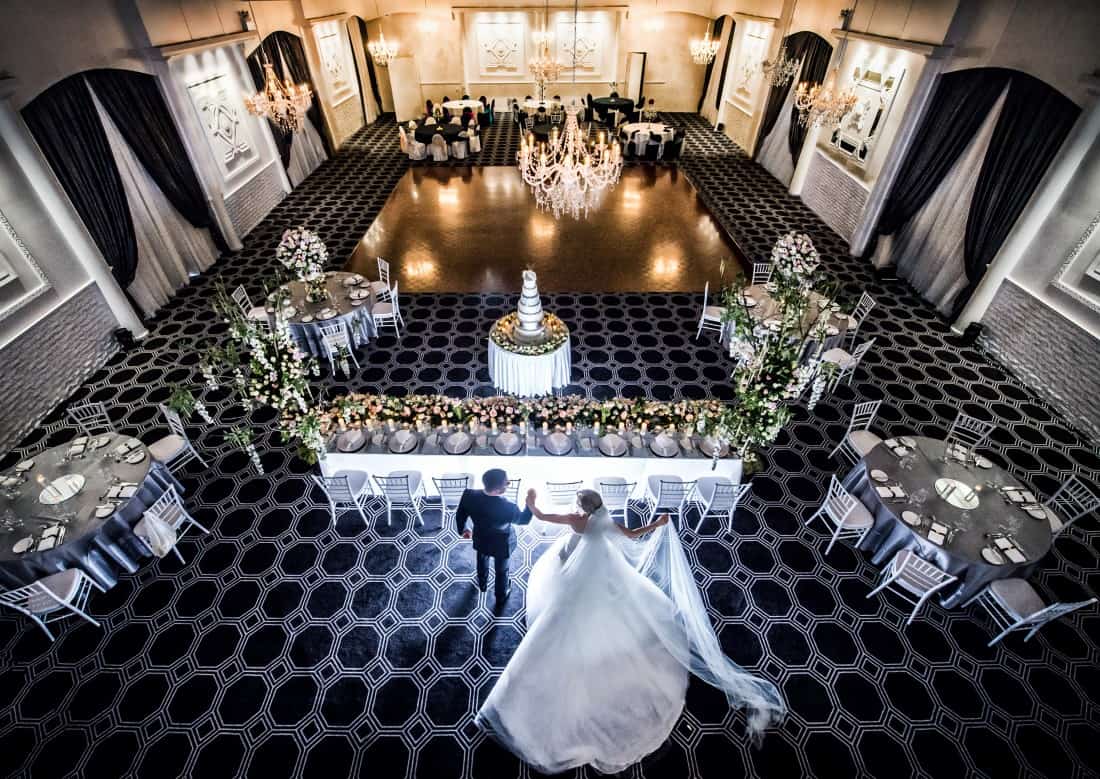Wedding planning can often feel overwhelming, but it doesn’t have to be a stressful experience. Adding playful and imaginative components to the process can transform wedding planning into an enjoyable journey. Start by setting a positive mindset and embracing the excitement of bringing your dream day to life. Break tasks into manageable pieces, and involve your partner, friends, and family to share the load. Infuse your personality into the planning, from DIY projects to playful brainstorming sessions, and celebrate small milestones. With a little organisation and a lot of joy, wedding planning can become a cherished part of your love story.
Summary
With the right approach, wedding planning can be enjoyable and stress-free. Start by setting a positive mindset and involving your partner, friends, and family to share the responsibilities. Give yourself plenty of time, ideally a year, to avoid rushing decisions. Break down tasks, communicate openly, and prioritise what’s most important to you. Incorporate fun elements like DIY projects, games, and creative challenges into the planning process.
Consider hiring a comprehensive service provider to reduce stress and maintain consistency. Manage expectations by communicating clearly with family and setting boundaries. Keep your budget realistic by researching costs and prioritising your spending. Remember to plan for life after the wedding and maintain balance by enjoying your engagement. With organisation and joy, wedding planning can be a cherished part of your love story.
Leave Yourself Plenty Of Time
One of the couples’ biggest mistakes is rushing into wedding planning immediately after getting engaged. This often leads to hasty decisions and added stress as they try to pull everything together quickly.
Tips For Allowing Enough Time:
- Set a Realistic Timeline: Aim to start planning at least a year. This gives you ample time to make thoughtful decisions and enjoy each step.
- Prioritise Early: Begin with the most critical decisions, such as setting a date, choosing a venue, and deciding on a guest list. These will shape the rest of your planning process.
- Avoid Last-Minute Rush: By starting early, you’ll reduce the likelihood of last-minute stress and ensure that everything falls into place smoothly.
Work As A Team From The Start
Wedding planning is a shared responsibility. While one partner may naturally take the lead, it is crucial to ensure both are involved in decision-making.
How To Work Together Effectively:
- Open Communication: Discuss your vision for the wedding early on, including your budget, preferred style, and guest list. Make sure you’re on the same page before diving into the details.
- Divide and Conquer: Split tasks based on each other’s strengths and interests. This way, neither partner feels overwhelmed, and both have a role in bringing the big day to life.
- Support Each Other: Remember, this is your first major project together as a couple. Use it to strengthen your partnership by supporting and understanding each other’s needs.
Building Your Wedding Team
You don’t have to do everything yourself. Encircle yourself with a group of friends who are encouraging, family, and professionals who can help lighten the load.
- Delegate Tasks: Assign specific tasks to close friends or family members eager to help. Whether collecting decorations, managing RSVPs, or coordinating with vendors, a little delegation goes a long way.
- Hire Professionals: Consider hiring a wedding planner or coordinator to manage the more complex aspects of your day. They can handle logistics, allowing you to focus on the fun parts of planning.
- Involve Your Bridal Party: Your bridesmaids and groomsmen are there to support you. Involve them in pre-wedding activities, DIY projects, and other tasks to make the experience more enjoyable.
Turn Planning Into A Game
Making wedding preparations into a game can transform what might otherwise be a tedious process into something fun and competitive.
Ideas For Gamifying The Process:
- Envelope Stamping Challenge: Compete with your partner to see who can stamp the most invitations in a set time.
- Signature Drink Contest: Host a cocktail party where friends and family compete to create the best signature drink for your wedding.
- Bridal Shower Games: Incorporate fun games into your bridal shower or engagement party, like trivia about the couple or wedding-related charades.
Consider Hiring A Comprehensive Service Provider
Managing multiple vendors can be one of the most stressful aspects of wedding planning. To streamline the process, consider hiring a provider offering multiple services under one roof.
Benefits Of Comprehensive Service Providers:
- Less Coordination: By working with a vendor who can handle several aspects of your wedding (e.g., catering, cake, and photography), you reduce the number of people you need to coordinate with.
- Consistent Quality: A single provider is more likely to deliver a consistent style and quality across different services, ensuring a cohesive look and feel for your wedding.
Manage Expectations And Communication
One of the main causes of stress when organising a wedding is dealing with differing expectations from family and friends. Early communication can help manage these expectations and avoid misunderstandings.
Strategies For Managing Expectations:
- Be Clear from the Start: If you’re planning a non-traditional wedding, a smaller guest list, or a destination wedding, communicate these choices early to avoid hurt feelings later.
- Involve Parents Thoughtfully: While it’s important to consider your parents’ opinions, remember that it’s your day. Be open but firm about the things that are most important to you.
- Set Boundaries: Politely but firmly set boundaries with well-meaning friends and relatives who may have strong opinions on your wedding plans. Remind them that this is your special day.
Create A Realistic Budget
A well-planned budget is essential for avoiding financial stress during wedding planning. Getting caught up in the excitement and overspending is easy, so staying grounded is important.
Tips For Budgeting Wisely:
- Research Costs: Before setting your budget, research the average costs of different wedding elements in your area. This will give you a more accurate idea of what to expect.
- Include Hidden Costs: Don’t forget to account for hidden costs like service charges, taxes, gratuities, and overtime fees. It’s better to overestimate than to be caught off guard later.
- Prioritise Spending: Focus your budget on the elements that matter most to you, whether the venue, photography, or entertainment. Be prepared to compromise on less important areas.
Plan For Life After The Wedding
While getting consumed by wedding planning is easy, Remember that your life is the broader picture together after the wedding.
Tips For Maintaining Balance:
- Enjoy Your Engagement: Enjoy your engagement without focusing solely on wedding planning. Go on dates, take trips, and make memories unrelated to the wedding.
- Plan for the Future: Use this time to discuss your goals for married life. What do you want to achieve together? What are your dreams and aspirations as a couple?
- Create a Plan B: Have a backup plan for anything that might not go as planned on your wedding day. Being organised will aid your composure and help you enjoy the day, whether it is weather-related or a vendor issue.
Conclusion
Wedding planning doesn’t have to be a stressful or overwhelming experience. Giving yourself plenty of time, working as a team, and keeping the process fun and creative can make this journey as enjoyable as the wedding day. Remember to communicate openly, manage expectations, and celebrate the small victories along the way. With the right mindset and approach, you’ll create a beautiful wedding and wonderful memories of the planning process.
FAQs About Wedding Planning
What Is The Most Stressful Part Of Wedding Planning?
Choosing a final guest list could be the most stressful wedding event. There may often be disagreements on who should (and shouldn’t!) be invited on the big day between you, your fiancé, and both parents. Although it can be difficult to turn down a visitor, it’s not reasonable to believe that your venue and budget will allow for everyone.
Is It Common To Find Wedding Planning Uninteresting?
This is a very stressful time, and it’s reasonable, acceptable, and applauded to get some support, whether it be from family, friends, or a mental health professional. If you don’t like the wedding planning process, we can’t stress this enough: You are not alone.
Red Flags Before Marriage: What Are They?
Some warning signs of poor communication from your partner include shutting down during difficult or emotional discussions, avoiding, downplaying, or ignoring disagreement entirely, looking for ways to escape accountability, and assigning blame to others or to you.
Can Planning A Wedding Cause Anxiety?
According to experts, pre-wedding jitters are a normal part of the process. Feeling anxious as you approach a big life milestone is natural. Admitting your feelings and looking for ways to handle them doesn’t mean you are getting cold feet.
How Long Does It Take To Plan A Wedding?
Recent studies show that the average time to prepare a wedding is between six and twelve months. Some busy couples also like to prolong the wedding planning period to 18 months to give themselves some more leeway. It’s best to finish wedding preparations as soon as possible.



